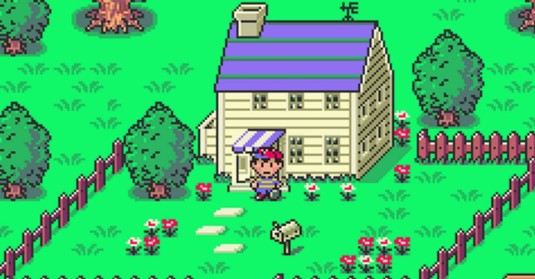
What is the fuss? There is the originality of the game. Unlike most 16-bit era RPGs, which were mostly (but not exclusively) fantasy affairs, a deliberately low-fi look in a present setting made it unique. Yet not stand out enough to ensure success, at least not for the time. How about the game mechanics? Some have waxed lyrical about Earthbound's innovations in this regard. Going for the standard number-based combat and experience system, the hit point counter is replaced by a tumbler. This has its uses as points for battle damage roll down very slowly, giving the character the option to finish off their opponent before the counter falls to zero. If that happens they stop accruing damage and therefore avoid the expensive resurrection feature. Also nice are the options of automating battles, and thanks to enemies appearing on the map a lot of battles (and therefore grinding tedium) can be avoided. Even better is when the band of characters have reached a certain level enemies can be defeated by simply walking into them, avoiding the battle screens altogether. Very nice. But hardly big departures of what went before. You can still use magic/psychic powers. You can still use items.
No, the reputation on which Earthbound is built is the story. In a scene reminiscent of 1953 classic, Invaders from Mars, the protagonist Ness (or whatever name the player decides to grant them) is woken from his bed by loud knocking at the door and a rumour something has come down in the hills. So there begins an adventure as hokey as anything found in B movies, replete with aliens, time travel, youthful hoodlums, and zombies. Ultimately the game culminates in a showdown with the apparent nemesis, Giygas, an antagonist sold as an alien leader but is revealed as an elemental spirit of evil. It can't be denied the showdown sequence really pushes the SNES with its graphical jiggery-pokery, and the stock of fan theories about what it all represents has helped contribute to the game's legend.
Speculating about the lore or the hidden meanings wrapped up therein isn't really my bag, but beginning with what the production staff intended is a good place to begin to understand its appeal. The project's lead, Shigesato Itoi, set out to create something that was a distillation of American culture while paying homage to the graphical style developed in the preceding game, the Japan-only Mother. It therefore delivers a double shot of nostalgia - a presentation reminiscent of 8-bit graphics while simultaneously improving on them and delivering something redolent of Saturday morning cartoons and, crucially, toys. The second is the setting. This is white middle America as it projects itself outward. The characters live in nicely-sized houses and their requisite picket fence with Mom and Dad, and each town in the game is nice with well presented public buildings, roads unchoked by traffic, but also the hint of a world unseen by adults that comprises the threat - a plot beloved of many so-called family movies of the 1980s.
This repetition of Americana and selling back to Americans, who have driven the fandom, also preserves the relations and tropes of Middle America. Ness doesn't strike as a jock, but his combat weapon of choice is the baseball bat and the ubiquitous cap suggests he's on his way to becoming one. This contrasts with the other characters who join the party: Paula, who later fills the girlfriend slot and deals and swings a mean frying pan (yes, really), proves pivotal in the final battle where it's her prayers that win the game. Woman as spirit being, is it? And woman as victim too. Her hit points are consistently calculated as the lowest of the cohort as she accumulates experience, and is therefore the most likely to kick the bucket in battle. There is also a brief interlude relatively early in the game where she is kidnapped and has to be rescued. Le sigh. Jeff is the poindexter boarding school personality type. He wears glasses, so he's obviously smart. He can fix broken items overnight when the player nips for a sleep at a hotel, and is the only one capable of operating technological items (bombs, rockets, bazookas, death rays). The final addition is Poo (yes), who is a caricature of all the orientalist tropes fanned by decades of Hollywood: lives in a temple, has his own mysterious master, finds sustenance in meagre helpings of rice and water, does martial arts, and has to undergo a spiritual journey to access the full range of his mystical powers. For a layer of gamers, particularly those of a certain age who might be exercised by more contemporary challenges to lazy sexist and racist stereotyping in video games, these kinds of depictions are a link to a privileged, persil-white culture subsequently retconned as the rosy frames to their childhoods.
Nevertheless, Earthbound is also a very nineties video game. Irreverence, gross out humour, the psychedelics, and occasional breaching of the fourth wall help to round out the game. It even features that rarest of digital antagonist: the police, who Ness has to beat up to progress the narrative. But they're possessed, so don't worry. The game isn't that edgy. Earthbound is also praised for its humour, which is more quirky than laugh-out-loud, but when joking was thin in games back then its idiosyncrasy in this regard has held up surprisingly well.
Indeed, despite the necessary cultural critique it is entertaining by today's standards in ways other 16-bit RPGs are not. The setting, the interpretation of American culture, but also the technical virtuosity, quirkiness, it's very easy to get into thanks to the undemanding gameplay. Truly, Earthbound is sought after because it's a good game and worth the time.
Image Credit
1 comment:
Still don’t the fuss over it honestly.
Post a Comment